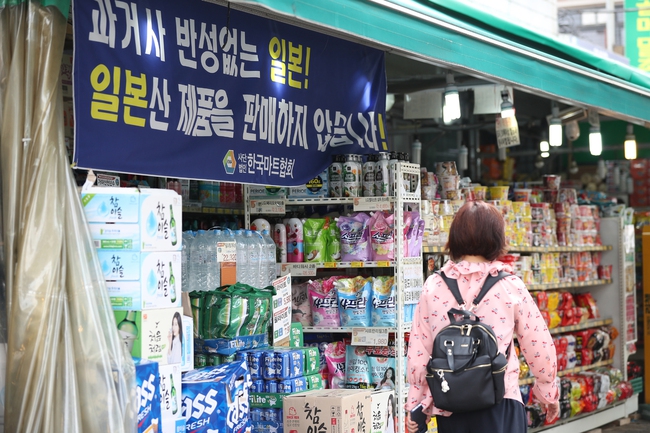 |
|
A small grocery store in Seoul, a member of the Korean Federation of Micro Enterprises (KMFE), hangs up a banner saying it has decided not to sell Japanese products on July 16. (Yonhap News)
|
Diplomatic source admits export controls are in partly response to forced labor ruling
Officials in the Japanese government are arguing that Japan’s export controls on South Korea are the result of Seoul’s poor management of strategic materials. Tokyo has been stepping up its promotion of this narrative in response to growing criticism, both domestically and internationally, of the export controls. On July 22, a Japanese official in charge of export management held a briefing in Tokyo for South Korean reporters about what Japan is calling its “reconsideration of exports to South Korea.” During the briefing, this official said that export regulations had been tightened because South Korea’s “catch-all” system only applies to weapons of mass destruction (WMD) and not to conventional weaponry. But Japan’s claims were contradicted by a diplomatic source in Tokyo. “South Korea operates a catch-all system through its Foreign Trade Act, though the terminology used there — ‘situational permit’ — is different,” the source said. The Japanese official said that a breakdown in dialogue with South Korea was one of the reasons for the tougher export regulations on South Korea. Japan and South Korea hadn’t been able to continue their previous policy dialogue about export management since last year, the official said, attributing this rupture to issues in their bilateral relationship. When asked whether that included the issue of forced labor, the official said that the two country’s relationship isn’t determined by individual issues but that forced labor was one of the issues affecting that relationship. In effect, the official admitted that the deterioration of the two countries’ relations was behind the export controls while still insisting that Japan wasn’t to blame. “The South Korean government has been proposing dialogue since March, and even prior to that, it had exchanged opinions [with Japan] at international conventions and other venues. The Japanese government’s claims aren’t accurate,” the diplomatic source in Tokyo said. Japan’s Ministry of Economy, Trade, and Industry, which is responsible for managing the country’s exports, also organized a briefing for Western reporters in recent days. Since July 17, the Ministry has been voicing Japan’s arguments — such as that the exports controls against South Korea are “not a countermeasure against any diplomatic issues” — on its English-language Twitter account, apparently in a bid to sway international public opinion. By Cho Ki-weon, Tokyo correspondent Please direct comments or questions to [english@hani.co.kr]






